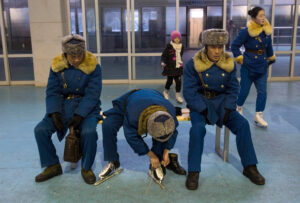With North Korea in the headlines again amid concerns it could explode a third, more powerful nuclear device, many people around the world may be wondering: What are they like?
 North Korea is “a real country with real people,” wrote John Everard, a former British ambassador to Pyongyang, in The Independent on Sunday.
North Korea is “a real country with real people,” wrote John Everard, a former British ambassador to Pyongyang, in The Independent on Sunday.
“Above all, North Koreans are sharply differentiated human beings, with a good sense of humor and are often fun to be with,” wrote Mr. Everard, who lived in the North Korean capital from 2006 to 2008 and is the author of a recent book about his time there, titled, “Only Beautiful, Please.”
Their everyday concerns “are often not so very different from our own: their friends, how their children are doing at school, their jobs, and making enough money to get by.”
Mr. Everard’s stay in Pyongyang took in the time of North Korea’s first nuclear test. As this article on 38 North, a Web site that follows the country closely, shows, the rest of the world is watching to see whether another nuclear detonation is imminent.
Tensions have grown since North Korea launched a rocket in December, provoking a new U.N. Security Council resolution last week condemning the launching and calling for a tightening of sanctions against the country. In a sign it’s really serious, even China, the North’s longtime ally, voted for the resolution.
In response, North Korea “bluntly threatened the United States, saying North Korea had no interest in talks on denuclearizing itself and would forge ahead with its missile and weapons development, with the goal of attaining the capability to hit American territory,” my colleagues Choe Sang-hun and Rick Gladstone wrote.
Against this nasty background, Mr. Everard shows the human dimension of citizens living in Pyongyang, focusing on a group of people he says he got to know fairly well; not the inner circle of power, but not the poor of the countryside, either. “They were executives rather than leaders.”
As nknews.org wrote last year, “Foreigners are allowed within a 35 km radius of Pyongyang, and Everard took every opportunity to visit and document within this area.”
So what were they like?
Over all, “Their lives would seem very dull to most Westerners,” Mr. Everard wrote. “They revolved around daily rituals of carefully phased breakfasts in overcrowded flats, tedious journeys to work (often prolonged because Pyongyang’s rickety public transport so often broke down), and generally tedious work days.”
Tedious, maybe, but “relaxed.” Yet, working day done, getting home wasn’t always easy. “Some of my contacts refused to use the Pyongyang metro because of the risk of a power cut while they were in a tunnel.” Some chose to walk home.
They were curious about the world. “I once lent one a set of DVDs of ‘Desperate Housewives’ and met the same person the next day with big rings under their eyes. They had sat up all night and watched the entire series in one sitting,” he wrote.
More fun, perhaps, than a visit home: “My contacts spoke of their parents with respect rather than affection, and chafed at the Confucian authority that they exercised. Visits to their homes seemed to be a duty rather than a pleasure, particularly when they involved dressing children up in their best and crossing Pyongyang (especially in autumn, when the city gets muddy – a difficult time to deliver clean children to grandparents),” he wrote.
Intriguingly, “Alcoholism and prostitution were rampant within the capital,” nknews.org reported, from a talk Mr. Everard gave last year.
And, “Although they all had access to showers, none could remember when they had last had one with hot water. Taking a cold shower in the Pyongyang winter, when temperatures can fall to -20C, is not fun,” Mr. Everard wrote in The Independent.
Most people he mingled with had enough food – but it wasn’t varied or tasty. “These people did not eat well, but at least they ate regularly,” mostly rice and boiled vegetables. And kimchi.
“Evening life at home revolved around chatting with family members and watching TV,” he wrote. “Sometimes there would be a film on. Even though North Korea had hardly produced any new films for some years before my time there, so that my contacts had seen almost all the national repertoire several times, they would still sometimes watch repeats. But the best time was the half-hour of (heavily edited and slanted) international news on Sunday evenings. Everyone watched that, and questioned me about what they had seen.”
While the anti-American propaganda the state puts out is powerful, not everyone believed it, wrote Mr. Everard.
“They had been taught to hate Americans, but most of them did not. One of them told me that they had worked with Americans during one of the thaws in relations with that country, had liked them and hoped that they would return,” wrote Mr. Everard. Of course this all was based on experiences that ended in 2008, but it’s unlikely attitudes have changed fundamentally since then, despite the latest round of threats to target the United States.
The New York Times













